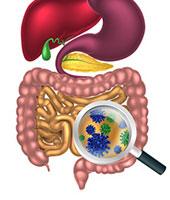21-09-2017
New discovery on the immune system and gut flora
 The immune system is a complex network, the role of which is to defend the body against pathogenic germs. It distinguishes between the body's own cells referred to as ‘self’, and foreign cells – called ‘non-self’, by means of a number of immune cells, the best-known of which are white cells or leukocytes. Scientists have discovered highly specific leukocytes in the intestines called CD4+CD8αα intestinal intraepithelial lymphocytes. According to a study published in August 2017 in the journal Science1, the action of these immune cells may be highly dependent on gut flora, and more specifically on a strain of probiotics called Lactobacillus reuteri. Here we explore this discovery and the link between the immune system and intestinal flora.
The immune system is a complex network, the role of which is to defend the body against pathogenic germs. It distinguishes between the body's own cells referred to as ‘self’, and foreign cells – called ‘non-self’, by means of a number of immune cells, the best-known of which are white cells or leukocytes. Scientists have discovered highly specific leukocytes in the intestines called CD4+CD8αα intestinal intraepithelial lymphocytes. According to a study published in August 2017 in the journal Science1, the action of these immune cells may be highly dependent on gut flora, and more specifically on a strain of probiotics called Lactobacillus reuteri. Here we explore this discovery and the link between the immune system and intestinal flora.
New class of immune cells in the gut
The intestinal immune system has for several decades been the subject of numerous studies. These have produced major advances such as the identification, and greater understanding, of the role of intestinal flora - the community of microorganisms that live in the intestines. The balance of this gut flora is now recognised as playing a key role in the intestinal immune system, as discussed in our article ‘Is there a ticking time bomb in your gut?’ . In the last few years, another discovery relating to the intestinal immune system has been made, though with perhaps less publicity: the identification of a new class of immune cells called CD4+CD8αα+ intestinal intraepithelial lymphocytes.
Key role in process of tolerance
Located in the epithelium of the small intestine, CD4+CD8αα+ intestinal intraepithelial lymphocytes may be involved in the process of tolerance. This is a mechanism studied extensively in immunology, and with good cause, since it enables the body to tolerate ‘self’ cells, in other words, to prevent the destruction of healthy cells. However, this tolerance is also applied to pathogens. In efforts to prevent this from happening, a number of scientists have investigated the role played by CD4+CD8αα+ intestinal intraepithelial lymphocytes in this process of tolerance. 2
Importance of bacterial gut flora
In examining the action of CD4+CD8αα+ intraepithelial lymphocytes, researchers have observed that these cells may result from the differentiation of CD4+ T lymphocytes, although this may only occur in the presence of certain bacteria. Indeed, scientists have noted the absence of CD4+CD8αα+ intestinal intraepithelial lymphocytes in mice with no bacterial germs in their intestines. Developing this finding, a team of American scientists noted that the differentiation process only occurred in the presence of a specific strain of probiotics called Lactobacillus reuteri. Known for its digestive and cardiovascular benefits, this strain may indirectly activate the differentiation of CD4+ T lymphocytes into CD4+CD8αα+ intraepithelial lymphocytes. According to the researchers, Lactobacillus reuteri may induce production of substances derived from dietary tryptophan - specific derivatives that may activate receptors in intestinal CD4+ T lymphocytes. Via a negative regulatory process, this may result in differentiation of immune cells into CD4+CD8αα+ lymphocytes.
These new discoveries confirm the role and importance of the bacterial strain Lactobacillus reuteri in the intestinal immune system. It may play a part in the process of tolerance by indirectly activating differentiation of CD4+ T lymphocytes into CD4+CD8αα+ lymphocytes. According to the researchers, this differentiation may require the presence of tryptophan, an amino acid known for being the precursor of several molecules in the body. An adequate intake of Lactobacillus reuteri and tryptophan may thus offer significant benefits for boosting the intestinal immune system.
> Sources :
1. L. Cervantes-Barragan et al., Lactobacillus reuteri induces gut intraepithelial CD4+CD8αα+ T cells, Science, 25 Août 2017, Volume 357, N°6353, Pages 806-810.
2. G. Malamut, et al., Lymphocytes intra-épithéliaux : impact en gastroentérologie, John Libbey Eurotext, Mai 2012, Volume 19, N°5.
Order the nutrients mentioned in this article

A new-generation probiotic that supports cardiovascular health
www.supersmart.com
Essential amino acid and precursor of serotonin, melatonin and niacin.
www.supersmart.comFurther reading
24-06-2019
Better known as PEA, palmitoylethanolamide is a natural and powerful active principle discovered in 1957. Since then, it has consistently been the subject of new...
Read more19-09-2016
The results of clinical research published over the last fifteen years highlight the many beneficial effects of probiotics. They appear to have both preventive and...
Read more14-03-2017
Allergies affect between 30% and 40% of the world’s population. They have multiple causes and take various forms such as food allergies, allergic rhinitis, asthma,...
Read more© 1997-2025 Fondation pour le Libre Choix
All rights reserved
All rights reserved
Free
Thank you for visiting our site. Before you go
REGISTER WITHClub SuperSmart
And take advantage
of exclusive benefits:
of exclusive benefits:
- Free: our weekly science-based newsletter "Nutranews"
- Special offers for club members only

















